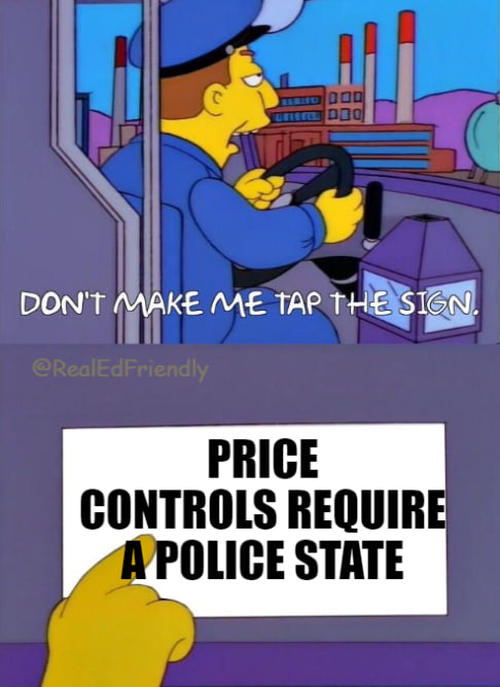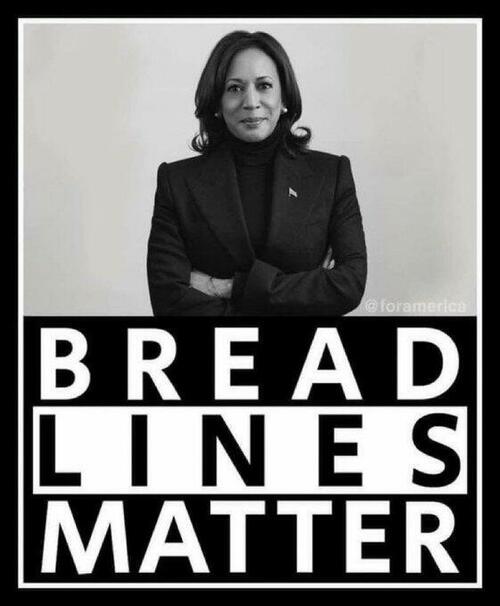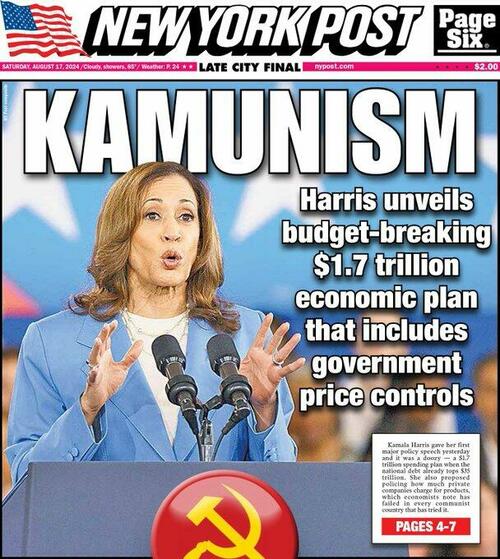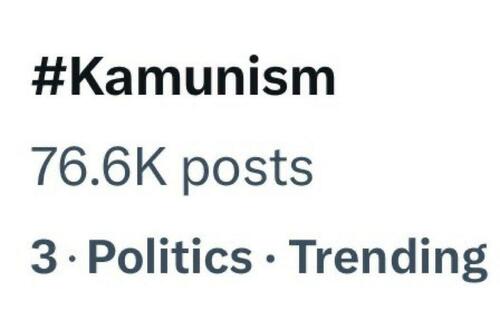Kamala Harris' Proposed Price Controls May Lead To "Communism, Mass Starvation, & End Of America"
At a rally in North Carolina on Friday, Vice President Kamala Harris, the Democratic nominee for president, unveiled her communist-style economic plan of 'price controls.' Her argument has been evil capitalism and corporations for rampant inflation, despite the reality that reckless government spending under her and President Biden is the primary driver of sky-high prices, particularly in the grocery store.
What's hilarious is that even Washington Post columnist Catherine Rampell criticized VP Harris' economic plan to implement price controls to stop "price gouging" on groceries.
"It's hard to exaggerate how bad this policy is," Rampell wrote. She titled the op-ed, "When your opponent calls you 'communist,' maybe don't propose price controls?"
On Saturday morning, Elon Musk reposted one food industry insider's step-by-step summary of what would happen if Harris' economic price control plan was implemented. Musk wrote, "Accurate conclusion (read the whole post)."
"I worked in M&A in the food industry," Robert Sterling wrote on X. He provided readers with a detailed step-by-step summary of what would happen:
The government announces that grocery retailers aren't allowed to raise prices.
Grocery stores, which operate on 1-2% net margins, can't survive if their suppliers raise prices. So the government announces that food producers (Kraft Heinz, ConAgra, Tyson, Hormel, et. al.) also aren't allowed to raise prices.
Not all grocery stores are created equal. Stores in lower-income areas make less money than those in higher-income areas, as the former disproportionately sell lower-margin prepackaged foods ("center of the store") instead of higher-margin fresh products like meat ("perimeter of the store"). Because stores in lower-income areas aren't able to cover overhead (remember, even if their wholesale costs are fixed, their labor, utilities, insurance, and other operating expenses aren't fixed… yet), grocery chains start to shut them down. Food deserts in rural areas and in low-income urban areas alike become worse.
Meanwhile, margins for food producers are also quickly eroding. Their primary costs (ingredients, energy, and labor) aren't fixed, and their shrinking gross profits leave less cash flow available to cover overhead, maintain facilities, and reinvest in additional production capacity.
Grocery chains, which have finite shelf space, start to repurpose their stores (those they didn't have to shut down, I should say) to sell more non-price-controlled items—everything from nutrition supplements to kitchenware to apparel—and less price-controlled food products. Your local Kroger or Safeway starts to look and feel more like a Walmart.
Food producers stop making products with lower margins. Grocery chain start competing with each other to secure inventory. Since they can't compete by offering stronger prices (remember, producers aren't allowed to raise prices here, and, even if they could, grocery chains no longer have the gross profit to bear price increases), they compete on things like payment terms.
Small grocery chains start to shut down entirely, or get sold to larger chains like Kroger. In addition to not being able to cover fixed costs, a major reason for this is because they can no longer reliably secure delivery of products, due to producers prioritizing sales to larger customers, which are able to leverage their stronger balance sheets to offer superior payment terms.
Smaller food producers—which typically sell via distributors, rather than directly to grocery chains—start to go out of business. Because these producers have an additional step their value chains, and because they have lower volumes over which to spread their fixed costs, their cost structure is inherently disadvantaged compared to major food producers. When grocery stores aren't able to raise prices, cutting product costs becomes all the more important, and deprioritizing purchases from smaller producers is an easy way to do so.
As supply chains break down, lines start to form outside grocery stores every morning. Cities assign police officers to patrol store parking lots, and food producers draft contingency plans to assign armed escorts to delivery trucks.
The federal government announces a program to issue block grants for states to purchase and operate shuttered grocery stores. The USDA also seizes closed-down production facilities.
The government announces that prices for all key food costs—corn, wheat, cattle, energy, etc.—are also now fixed, to stop "profiteers" from gouging the now-government-operated food industry.
Shockingly, the government struggles to operate one of the most complex industries on the planet. The entire food supply chain starts imploding.
Communism, mass starvation, and the end of America quickly ensue.
Accurate conclusion (read the whole post) https://t.co/E0JcF2lxoG
— Elon Musk (@elonmusk) August 17, 2024
In a separate post, Sterling noted, "The impact on small rural communities would be terrible. I hate driving through small towns in the Midwest and seeing a DG next to a closed-down grocery store that operated from 1900 to 2018."
Really appreciate it, brother. And, to your point, the impact on small rural communities would be terrible. I hate driving through small towns in the Midwest and seeing a DG next to a closed-down grocery store that operated from 1900 to 2018.
— Robert Sterling (@RobertMSterling) August 17, 2024
"Inflation is experienced at the grocery store, but always manufactured by the government. It's the same story every time. The politicians who create it by printing money, villainize and blame companies that have nothing to do with it — to distract from their reckless spending," Cameron Winklevoss wrote on X.
Inflation is experienced at the grocery store, but always manufactured by the government. It's the same story every time. The politicians who create it by printing money, villainize and blame companies that have nothing to do with it — to distract from their reckless spending. https://t.co/EJkng1004Q
— Cameron Winklevoss (@cameron) August 16, 2024
Hmm.
Yeah.
We're glad Americans just woke up in a big way - in recent days - to understand finally far-left radical VP Harris is nothing more than a communist-pusher.
Trending on X.
Which way, Western man?



